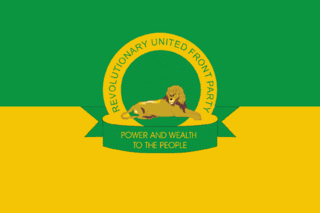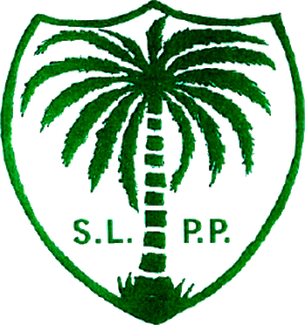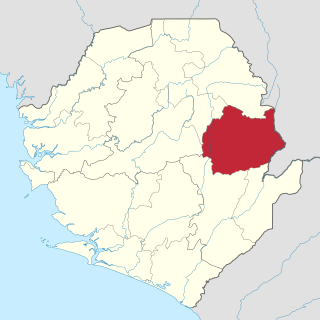Related Research Articles

Sierra Leone, officially the Republic of Sierra Leone, is a country on the southwest coast of West Africa. It shares its southeastern border with Liberia, and the northern half of the nation is surrounded by Guinea. Covering a total area of 71,740 km2 (27,699 sq mi), Sierra Leone has a tropical climate, with diverse environments ranging from savanna to rainforests. The country has a population of 7,092,113 as of the 2015 census. Freetown is the capital and largest city. The country is divided into five administrative regions, which are subdivided into 16 districts.

The Republic of Sierra Leone Armed Forces are the armed forces of Sierra Leone, responsible for the territorial security of Sierra Leone's borders and defending the national interests of Sierra Leone, within the framework of the 1991 Sierra Leone Constitution and International laws. The armed forces were formed after independence in 1961, on the basis of elements of the former British Royal West African Frontier Force, then present in the Sierra Leone Colony and Protectorate.

The Revolutionary United Front (RUF) was a rebel group that fought a failed eleven-year war in Sierra Leone, beginning in 1991 and ending in 2002. It later transformed into a political party, which still exists today. The three most senior surviving leaders, Issa Sesay, Morris Kallon and Augustine Gbao, were convicted in February 2009 of war crimes and crimes against humanity.

Alhaji Ahmad Tejan Kabbah was a Sierra Leonean politician who served twice as the 3rd President of Sierra Leone, from 1996 to 1997 and again from 1998 to 2007. An economist and attorney by profession, Kabbah spent many years working for the United Nations Development Programme. He retired from the United Nations and returned to Sierra Leone in 1992.

The Sierra Leone People's Party (SLPP) is one of the two major political parties in Sierra Leone, along with its main political rival the All People's Congress (APC). It has been the ruling party in Sierra Leone since 4 April 2018. The SLPP dominated Sierra Leone's politics from its foundation in 1951 to 1967, when it lost the 1967 parliamentary election to the APC, led by Siaka Stevens. Originally a centre-right, conservative party, it identifies since 2012 as a centre-left social democratic party, with a centrist tendency.

The Mende are one of the two largest ethnic groups in Sierra Leone; their neighbours, the Temne people, constitute the largest ethnic group at 35.5% of the total population, which is slightly larger than the Mende at 31.2%. The Mende are predominantly found in the Southern Province and the Eastern Province. The Mende are mostly farmers and hunters. Some of the major cities with significant Mende populations include Bo, Kenema, Kailahun, and Moyamba.

Julius Maada Wonie Bio is a Sierra Leonean politician, and the current president of Sierra Leone since 4 April 2018. He is a retired brigadier in the Sierra Leone Army and was the military head of state of Sierra Leone from 16 January 1996 to 29 March 1996, in a military junta government known as the National Provisional Ruling Council (NPRC).
John Albert Musselman Karefa-Smart was a Sierra Leonean politician, medical doctor and university professor. He served as the first Foreign Minister under Sierra Leone's first Prime Minister, Sir Milton Margai. He was an ordained Elder of the United Methodist Church.
Edward Mohamed Turay was a Sierra Leonean politician and diplomat. He was leader of the opposition All People's Congress (APC) from 1996 to 2002. He was the Sierra Leonean High Commissioner to the United Kingdom from 2010 until his death in 2023.

Ernest Bai Koroma is a Sierra Leonean politician who served as the fourth President of Sierra Leone from 17 September 2007 to 4 April 2018.
Mohamed Yahya Sillah is a Sierra Leonean politician, journalist and human rights activist. He was active in the transition efforts from military to civilian rule in Sierra Leone. As the National Chairman of the National Alliance Democratic Party (NADP), he was an unsuccessful candidate in the 1996 Presidential elections.

Kono District is a district in the Eastern Province of Sierra Leone. Its capital and largest city is Koidu Town. Motema is the second most populous city in the district. The other major towns in the district include Yengema, Tombodu, Jaiama Nimikor and Sewafe. The district is the largest diamond producer in Sierra Leone. The population of Kono District is 505,767. Kono District borders Kenema District to the southwest, The Republic of Guinea to the east, Koinadugu District to the northeast and Kailahun District to the southeast. Kono District is divided into fourteen chiefdoms.

Kenema District is a district in the Eastern Province of Sierra Leone. Its capital and largest city is Kenema, which is the third most populous city in Sierra Leone, after Freetown and Bo. Tongo is the second most populous city in the district. Other major towns in Kenema District include Blama and Yomboma. The district is the most populous district in the Eastern province with a population 609,873. Kenema District has an area of 6,053 km2 (2,337 sq mi) and comprises sixteen chiefdoms.

Dr Samura Mathew Wilson Kamara is a Sierra Leonean politician and economist. He was the All Peoples Congress (APC) Party's candidate for President of Sierra Leone in the 2018 election. He was the Minister of Foreign Affairs and International Cooperation of Sierra Leone from 2012 to 2017, Minister of Finance and Economic Development from 2009 to 2013, Governor of the Bank of Sierra Leone from 2007 to 2009, Financial Secretary in the Ministry of Finance during President Ahmad Tejan Kabbah's administration.
Mandinka people of Sierra Leone is a major ethnic group in Sierra Leone and a branch of the Mandinka people of West Africa. Most Sierra Leonean Mandingo are the direct descendants of Mandinka settlers from Guinea, who settled in the north and eastern part of Sierra Leone, beginning in the late 1870s to the 1890s under the rule of prominent Mandinka Muslim cleric Samori Ture. Also later a significantly large population of Mandinka from Guinea migrated and settled in Eastern Sierra Leone and Northern Sierra Leone in the early to mid 20th century. The Mandingo people of Sierra Leone have a very close friendly and allied relationship with their neighbors the Mandingo people of Guinea and Liberia, as they share pretty much identical dialect of the Mandingo language, tradition, culture and food.
Sierra Leonean Americans are an ethnic group of Americans of full or partial Sierra Leonean ancestry. This includes Sierra Leone Creoles whose ancestors were African American Black Loyalists freed after fighting on the side of the British during the American Revolutionary War. Some African Americans trace their roots to indigenous enslaved Sierra Leoneans exported to the United States between the 18th and early 19th century. In particular, the Gullah people of partial Sierra Leonean ancestry, fled their owners and settled in parts of South Carolina, Georgia, and the Sea Islands, where they still retain their cultural heritage. The first wave of Sierra Leoneans to the United States, after the slavery period, was after the Sierra Leone Civil War in the 1990s and early 2000s. According to the American Community Survey, there are 34,161 Sierra Leonean immigrants living in the United States.
Sylvia Olayinka Walmina Oreshola Blyden is a Sierra Leonean journalist, political commentator, newspaper publisher, and former Sierra Leone minister of Social Welfare, Gender and Children Affairs under erstwhile President Ernest Bai-Koroma from 2016 to 2017. She served as Special Executive Assistant to Sierra Leone's former president Ernest Bai Koroma from 2013 to 2015.

Sierra Leone is officially a secular state, although Islam and Christianity are the two main and dominant religions in the country. The constitution of Sierra Leone provides for freedom of religion and the Sierra Leone Government generally protects it. The Sierra Leone Government is constitutionally forbidden from establishing a state religion, though Muslim and Christian prayers are usually held in the country at the beginning of major political occasions, including presidential inauguration.
Literature of Sierra Leone is the collection of written and spoken work, mostly fictional, from Sierra Leone. The coastal west-African country suffered a civil war from 1991 until 2002. Before the civil war, Sierra Leone had many writers contributing to its literature and since the end of the war the country has been in the process of rebuilding this literature. This is an overview of some important aspects of the literature of Sierra Leone before, during, and after the war.
The Order of the Rokel is the second order of Sierra Leone, after the Order of the Republic. It may be awarded to recognize Sierra Leoneans who have distinguished themselves by making valuable contributions to the country in the areas of to the public service, arts and sciences, and philanthropy. The award is normally awarded by the President of Sierra Leone.
References
- ↑ "Change Sierra Leone". www.changesierraleone.org. Archived from the original on 17 August 2007.
- ↑ "Memory Lane: John Leigh blasts SLPP aspirants". www.thepatrioticvanguard.com.